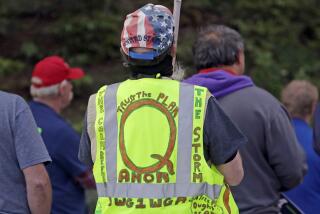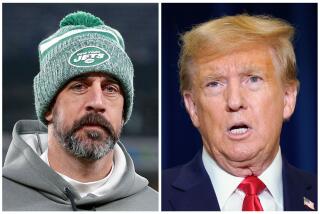The case for treason
- Share via
AN AMERICAN CITIZEN broadcasts propaganda for the enemy, intending to help defeat the United States. The government indicts the citizen for treason. That’s the Adam Gadahn story from Thursday’s newspaper -- but it’s also the story of Tokyo Rose, Axis Sally and other Americans after World War II.
Gadahn, who grew up in Orange County, has become a spokesman for Al Qaeda, making videos urging U.S. soldiers to desert and encouraging others to join Al Qaeda. Likewise, 60 years ago, several American citizens helped produce Axis broadcasts aimed at undermining U.S. soldiers’ morale. They were prosecuted for treason and convicted.
The most famous one, who was linked to the Tokyo Rose broadcasts, was later exonerated and eventually pardoned, but the legal principle established in those cases remains. In the words of one court, “Collaborat[ing with the enemy] in the execution of a program of psychological warfare designed ... to weaken the power of the United States to wage war successfully” -- even if the program fails -- may be treason.
The substantive case against Gadahn appears strong. The Constitution defines treason narrowly, as “levying War against [the United States], or in adhering to their Enemies, giving them Aid and Comfort”; courts have made clear that “adhering” to the enemy means purposefully advancing the enemy’s cause. But Gadahn fits within this narrow definition. Because propaganda has long been a war-making tool, conspiring with the enemy to help it recruit or demoralize is just as punishable as helping it build a bomb.
Moreover, this principle applies to the war against Al Qaeda as much as to the war against the Axis. U.S. law has long recognized that war can include not just war against other nations but conflicts against other armed groups, such as domestic rebels or Indian tribes. War with a transnational terrorist organization -- especially one that’s also working with the remnants of the old Afghan and Iraqi regimes -- would qualify.
Treason can also occur even in wars that aren’t officially declared (such as the Civil War or the Korean War), and, in any event, the Authorization for the Use of Military Force that Congress passed after 9/11 counts as a declaration of war, as Sen. Joseph R. Biden Jr. (D-Del.), who drafted the authorization, has stated.
Some have argued that the 1st Amendment protects even propaganda on the enemy’s behalf, and it’s true that the Constitution does generally protect expressions of hostility to the United States -- even ones aimed at harming morale and helping our enemies. Only advocacy that’s intended to and likely to cause imminent illegal conduct -- not just desertion or treason sometime in the future -- is generally punishable.
But Gadahn, like the 1940s propagandists, isn’t being prosecuted just for expressing his personal views. He’s accused of entering into a conspiracy with our enemy, a conspiracy in which the enemy tries to kill Americans and Gadahn acts as the enemy’s tool. As one post-World War II court put it, “Trafficking with the enemy” -- in the sense of close collaboration, rather than just independent expression of support -- “is wholly outside the shelter of the 1st Amendment.”
Still, the government may face a procedural difficulty trying this case. The Constitution makes treason a hard crime to prove: “No Person shall be convicted of Treason unless on the Testimony of two Witnesses to the same overt Act, or on Confession in open Court.” To convict Gadahn, the government must catch not just him but two witnesses who can testify to his participation in the videos, unless it can persuade him to confess in open court. Simply introducing the videos would likely not suffice because the Constitution calls for witnesses, not just tangible evidence or the testimony of people who saw videos of him making the propaganda messages sometime after the fact.
Perhaps a court might conclude that, just as the Constitution’s references to “speech” and “press” have been read to cover movies and the Internet, and just as the document’s authorization of “Armies” and a “Navy” has been read to also allow air forces, so the “Witnesses” requirement should be adapted in light of technological changes to cover people who had seen the event by video. Adapting constitutional text in light of technological changes -- as opposed to social or ideological changes -- is a broadly accepted technique, even among judges who usually focus on the Constitution’s original meaning.
Yet the ease with which videos can be doctored counsels in favor of reading “Witnesses” strictly, and if the term is so read, the treason prosecution will require witnesses who personally saw Gadahn working in the propaganda effort.
Even if the government can’t get those two witnesses, Gadahn may still be convicted on another charge -- providing material support to terrorists. Proving this second charge requires only the normal proof beyond a reasonable doubt, with no need for direct witnesses. But the framers of the Constitution deliberately made a treason charge hard to prove, which may be one reason why no one has tried in 50 years.
More to Read
Sign up for Essential California
The most important California stories and recommendations in your inbox every morning.
You may occasionally receive promotional content from the Los Angeles Times.












